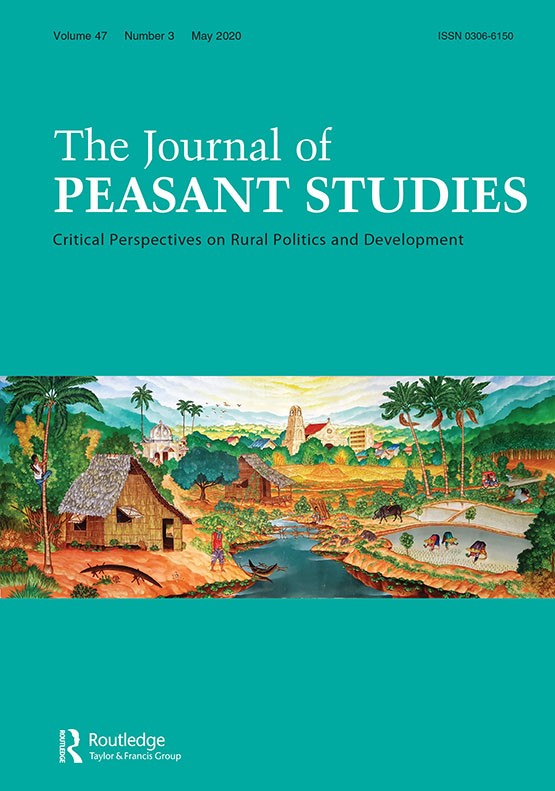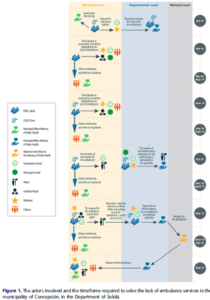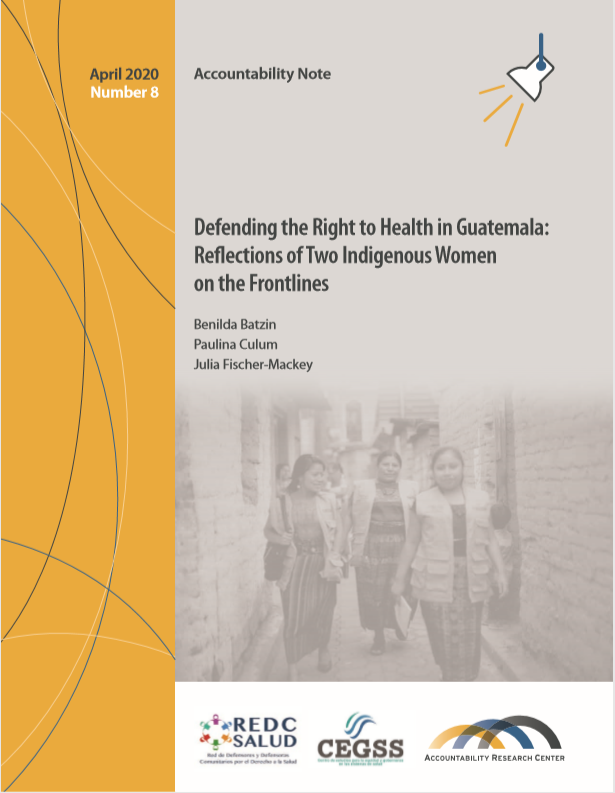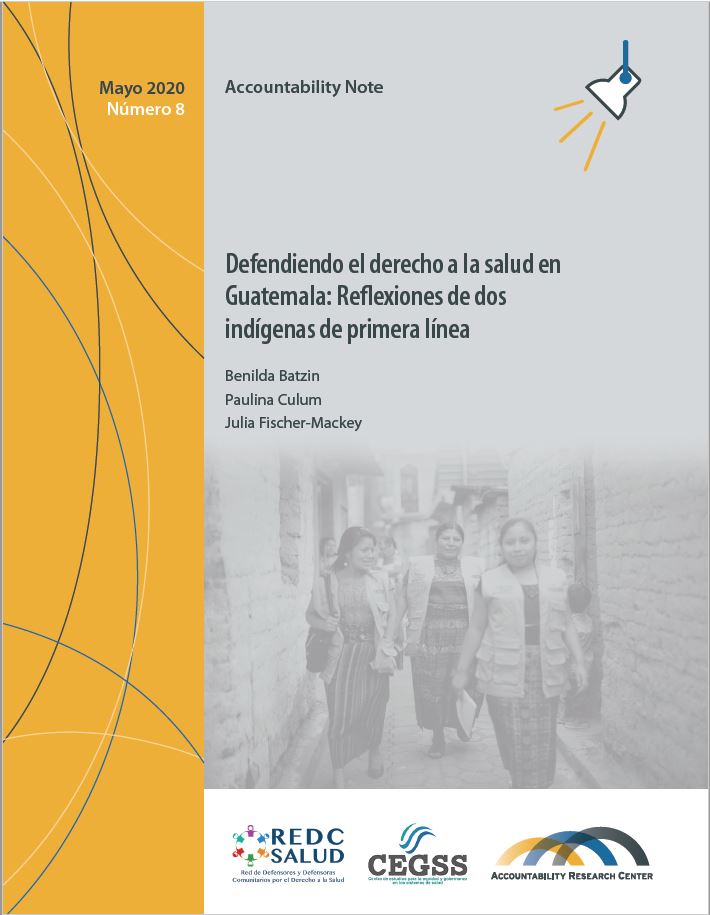
Rural public health systems and accountability politics: insights from grassroots health rights defenders in Guatemala
Date: May 2020
Author(s): Julia Fischer-Mackey, Benilda Batzin, Paulina Culum & Jonathan Fox
Publication type: Scholarly Journal Article
Published by: The Journal of Peasant Studies
Note: This article was originally published in The Journal of Peasant StudiesVolume 47, 2020 – Issue 5. As the pandemic reveals how multiple intersecting inequalities affect public health, the work of rural activists defending their communities’ rights to health, land, and gender, ethnic and environmental justice demonstrate how intersectional analysis can be put into practice. In the interviews that follow, Guatemalan Maya Tz’utujil activists Paulina Culum and Benilda Batzin describe how ‘health rights defenders’ seek justice for rural indigenous communities – work that the pandemic makes more critical than ever. Their strategies and insights have implications for addressing rural health rights around the world.
Preface: Framing struggles for rural health rights
Jonathan Fox April 22, 2020 The world is rethinking what the right to health means in practice. Researchers are no exception, and the global pandemic is obliging us to think beyond our sectoral silos. Many rural activists have long been doing this, defending their communities on multiple fronts at the same time – including the fight for health rights along with their struggles for land, gender, ethnic and environmental justice. The Journal of Peasant Studies’ ‘Grassroots Voices’ section is well positioned to contribute, creating a space to listen and learn, in keeping with the journal’s goal of ‘special attention to questions of “agency” of marginalized groups in agrarian societies, particularly their autonomy and capacity to interpret – and change – their condition.’ Health rights struggles are an arena of agency that has so far received little attention in agrarian studies.1 The interviews that follow with Guatemalan Maya Tz’utujil activists Paulina Culum and Benilda Batzin shed light on how grassroots ‘health rights defenders’ put intersectional analysis into practice. They challenge social exclusion at one of the state’s most significant interfaces in their communities: the public health system. Just as the pandemic reveals multiple preexisting inequalities, analysis of health rights struggles sheds light on state-society relations more broadly. Like other public services, public health systems both produce and reproduce multiple, mutually reinforcing inequalities. Health systems have been studied primarily through a public health lens, rarely from a rural development perspective.2 Conventional approaches to health system governance address accountability issues, but primarily through the lens of ‘upwards accountability,’ whereby frontline service providers report to managers, who in turn report to policymakers, who report to elected officials, as well as to international donors and national financial sector technocrats who control the purse-strings. In contrast, the lens of ‘downwards’ accountability focuses on whether and how public service providers actually serve the public. Adding these adjectives to accountability is not mere academic parsing – the concept itself is so ambiguous and contested that effective communication requires specifying its inherently relational nature. Who is to be held accountable by whom? Is the term part of a bureaucratic audit culture, imposed from above, or is it a banner to be waved in democratic struggles against impunity and injustice, as movements call on public servants to serve the public? Accountability is a trans-ideological concept and is therefore both contested and up for grabs (Fox 2018).3 Accountability agendas in the public health field focus primarily on health workers, often to the exclusion of more systemic analyses of ‘who gets what.’ The pandemic is redefining the roles of health workers – an umbrella category that ranges from highly privileged professionals to low status paraprofessionals and volunteer community leaders. In contrast to these sharp, often gendered hierarchies, the shared threat of contagion has led ‘health worker’ to become a more inclusive collective identity. In contrast with classic frames as caregivers or functionaries, the identity of ‘frontline workers’ is also being socially (re)constructed and broadened.4 Against the backdrop of social science research that has treated health workers as the target of audit cultures and top-down accountability measures, researchers face a new imperative to understand how and why some health systems manage to inspire service providers with a sense of mission, while others do not.5 Now, because of the pandemic, totally new arenas of rights struggles are also emerging, as health workers begin to fight for the right to protect themselves while doing their jobs, while their lack of protection is already leading to discrimination and stigma from those who may perceive them as contaminated threats. The shared interest between health workers and citizens in protecting health workers from contagion creates new coalitional possibilities. Yet for experienced grassroots rights defenders like Paulina Culum and Benilda Batzin, whose struggle has been to exercise their legal right to oversee the state’s interactions with indigenous communities, relationships with government health workers are complex and sometimes contested. On the one hand, health workers represent what little access to formal health care that most rural citizens have, working with the very limited public resources that the central government provides to clinics in indigenous territories. At the same time, doctors and nurses sometimes transmit hegemonic practices of racial, linguistic, gender and class discrimination, both to their patients and to lower status health workers. They may engage in charging illegal user fees and other abuses.6 This focus on health rights as a key state-society interface leads to the role of community health workers (CHWs), who play a bridging role between state and society.7 They are expected to both represent the state to society, as cogs in the system, while also (sometimes) representing their communities to the state (Schaaf, M. et al. 2018a, 2018b, 2020). This frontline role is often referred to as the ‘last mile,’ a term that implies a view from above, from centers of power and decision-making. In contrast, seen from the community level, these paraprofessional outreach workers are the first mile, in term of accessing the state (Boydell, Fox, and Shaw 2017). The community health worker tradition goes back to the 1930s and was famously expanded in Maoist China as ‘barefoot doctors.’ Promoted by the watershed 1978 Alma Ata global health summit, many countries have long deployed vast armies of these community paraprofessionals (e.g. Bangladesh, Brazil, Ethiopia, India, Malawi, Mexico, Myanmar, Nepal, Pakistan, Rwanda, Thailand, South Africa, among others). CHWs are likely to be called upon to help to address the pandemic. In some countries, CHWs are organized into large unions, which are needed to defend both community health rights and their own rights as workers (e.g. Brazil, India, Pakistan). India’s National Rural Health Mission, launched in 2005, dramatically increased the size of the government’s CHW program and they are unionized in several states.8 Notable Indian CHW innovations include the Mitanin program in the state of Chhattisgarh, where a semi-autonomous government agency recruits, trains and supports nearly 70,000 CHWs with a community organizing ethos, working mainly with women from indigenous and Dalit backgrounds through a train-the-trainer approach (Garg and Pande 2018; Nabiar and Sheikh 2016). CHWs often serve their own and/or neighboring communities and speak multiple languages, enabling them to build trust and effectively communicate essential health information. Governmental respect for CHWs as community voices can help to address the lack of trust between citizens and health authorities that has impeded public health measures in epidemics such as Ebola (e.g. Yamanis, Nolan, and Shepler 2016). Many governments also promote community health committees that nominally play an oversight or co-management role for rural clinics and health posts. Though these local committees often exist only on paper, some governments have experimented with large-scale efforts to activate them to bolster citizen oversight, most notably in India.9 A different strategy to encourage public health systems to become more responsive to rural communities relies on networks of completely non-governmental citizen monitors, such as the defenders profiled here. Public health practitioners have joined with grassroots leaders to experiment with these independent community-based health system oversight strategies.10 The testimonies from Paulina Culum and Benilda Batzin are emblematic of these rural health rights struggles. They represent the Network of Community Health Rights Defenders (REDC-Salud) and the Center for the Study of Health System Equity and Governance (CEGSS), organizations that are committed to an especially strategic, power-shifting approach in the emerging field of ‘accountability work.’ Their approach to building public accountability into state-society relations is distinctive in at least eight ways. First, their grassroots health rights struggle invented a public collective identity of ‘defender,’ grounded in elected, organic community leadership and gender equity.11 The defenders wear their politically constructed identity proudly, with the term emblazoned on the backs of their distinctive work vests in its gender-neutral form – Defensor(a). Their mission includes educating their own and neighboring communities about their rights, interviewing people at clinics to document possible abuses and seek recourse, while broadcasting rights messages on community radio in Mayan languages that appropriate claims drawn from national laws that would otherwise just gather dust. Second, in the world of civil-society-building, the alliance between CEGSS and REDC has constructed a balanced CSO-grassroots movement relationship – always easier said than done. While CEGSS emerged from the field of public health, it has more recently transitioned to take on a broader democratic reform agenda. The network of volunteer indigenous defenders recruits experienced community leaders, many with long track records of campaigning for indigenous women’s rights, grassroots development or against toxic mining. Third, CEGSS and the Network of Defenders are committed to evidence-based advocacy and problem-solving. In their early years they followed a mainstream public health approach to evidence, yet they found that local authorities were unimpressed by well-organized quantitative data. Over time they diversified their evidence-gathering approach, emphasizing tools that grassroots leaders could take on, such as audio and visual testimonies – which proved to be harder to ignore (Flores 2018). Fourth, in contrast to many of the approaches to citizen engagement and social accountability promoted by the development industry and national governments around the world, these organizers are building countervailing power. This concept focuses on actors with the capacity to push back against concentrations of elite power, both in state and society. Though this idea is key to understanding what makes public accountability possible – it is largely missing from the ‘light touch’ field experiments that dominate mainstream social science research in the emerging field of transparency and accountability (Fox 2015). As Fung and Wright put it, countervailing power refers to ‘a variety of mechanisms that reduce, and perhaps even neutralize the power advantages of ordinarily powerful actors’ (2003, 260). Countervailing power involves bargaining power – the leverage needed both to question authority without reprisals – and to get those in power to listen. Countervailing power can be expressed in either adversarial or collaborative terms, but it is constituted by actors or institutions with some capacity to tangibly push back and constrain the abuse of power.12 Fifth, together with CEGSS, the defenders connect their local oversight work with provincial and national level problem-solving and policy advocacy, transcending conventional localistic approaches. In contrast to mainstream approaches to social accountability that address symptoms rather than underlying, systemic causes of social exclusion, this alliance pursues multi-level independent policy monitoring and advocacy. They combine problem-solving in response to felt community needs (like missing ambulances) with ‘upstream’ efforts to promote more inclusionary national policies, such as socially responsible health budgets and anti-corruption efforts. This multi-level strategy is also known as ‘vertical integration,’ a term that draws on the political economy metaphor in an effort to capture the idea of trying to coordinate efforts to monitor and influence each link in the chain of decision-making of powerful actors, from global and national to local.13 Sixth, their approach bridges a ‘speak truth to power’ social accountability strategy with the legal empowerment approach. Legal empowerment has been pursued extensively around the world, across issue areas – though primarily in the countryside, and with special attention to land rights. Legal empowerment approaches have many moving parts, but the core involves training and deploying community paralegals to help to ‘squeeze bits of justice out of unjust systems’ (Feinglass, Gomes, and Maru 2016; Joshi 2017; Maru and Gauri 2018). Seventh, the Guatemalan strategy profiled here transcends the conventional dichotomy between adversarial and collaborative approaches to engaging with the state. Where the defenders identify rights violations or corruption, they use their socially grounded advocacy tools and legal complaints to push back. At the same time, they seek to work with government counterparts who are respectful and responsive, leading to partnerships with mayors, municipal development councils, health system administrators and the government’s Human Rights Ombuds office.14 In more theoretical terms, their action repertoire transcends a two-dimensional view of collaborative vs. adversarial approaches, illustrating instead a three-dimensional approach to state-society relations that has space for simultaneous collaboration and confrontation (Fox 2016). They target different elements within the state depending on where the pro and anti-accountability forces are located. Eighth, Paulina Culum and Benilda Batzin represent reflective learning organizations that put democratic principles into practice, inspired by a Latin American legacy of popular education that lives on in the region’s social movements – in spite of the ebbs and flows of national politics. Their commitment to learning includes a sustained emphasis on action-research that has informed both their own strategy and the work of counterparts around the world, including efforts to introduce more pluralistic approaches to evidence to the field of public health (Flores 2018). The testimonies that follow spotlight the analyses of ‘action-strategists.’ The Accountability Research Center works with this new term to describe activists and other practitioners in a way that recognizes that they are knowledge producers, with analytical insights that inform action – and should also inform research agendas. To sum up, the CEGSS and REDC experience illustrates numerous cutting-edge issues involved with rural health rights struggles more generally. Yet it is their combination of these distinctive characteristics that makes their experience so important to listen to. This Grassroots Voices section’s focus on learning from rural health rights struggles and the role of agency points to both strengths and limitations of critical development studies approaches to these issues. The critical development studies literature that addresses health focuses primarily on state vs. market-led regimes, the drivers of inequality, the influence of international agenda-setting and concern for neoliberal co-optation of elements of progressive public health agendas.15 This focus is reflected in the diverse analyses convened by O’Laughlin (2016). She concludes, however, that those approaches ‘offered more in critique than in providing an alternative transformative vision of how to reclaim politically the space of reform’ (O’Laughlin 2016, 705). Indeed, the critical development studies literature could do more to address the actors, movements, campaigns and strategies involved in health rights struggles – as well as their research needs. It is especially relevant to identify where key decisions in health systems are made, which can help to distinguish between the symptoms and the causes of inadequate service provision. 16 Relevant research strategies include institutional ethnography and follow-the-money political economy analysis, to identify who gets what – and who decides – with greater precision. Specifically, problem-driven research agendas can help to inform change strategies by disentangling the inter-related but distinct problems of corruption, systemic social bias and exclusion, administrative dysfunction, and insufficient public funding – as well as by distinguishing between the responsibilities of local, national and international health system actors. To sum up, from the point of view of accountability politics, one of the practical research challenges for rural health rights advocates involves how to open up the black box of the system to identify the underlying causes of failures with greater precision. To come back to the relevance of this Grassroots Voices section of JPS to the global pandemic and economic crisis, it is far from clear how these twin shocks will affect rural peoples in the global South. State capacity and social safety nets are being put to the test all over the world. While regimes with authoritarian inclinations reach for more power, social movements are feeling out their new constraints. After a decade of ebbs and flows of movement efforts to seek synergy between online and face-to-face organizing all over the world, rural organizers now have little choice other than to experiment with digital repertoires, from low-bandwidth WhatsApp to new hashtags like Via Campesina’s #StayHomeButNotSilent. We are in a new age of coming together while staying apart, which challenges our creativity to invent and refine new forms of dialog between activists and researchers. Yet such dialog is needed now more than ever, to address the forced isolation of rural communities and the socially excluded who are not online, to raise awareness of their specific vulnerabilities, and to inform possible change strategies. Frontline rural health rights activists are especially well-positioned to anticipate and report potential gaps or negative effects of government policies to address the pandemic.17 This critical juncture creates both new threats and new opportunities for rural rights defenders. New actors, coalitions and repertoires may emerge, while longstanding actions and approaches will be put to the test. These unfolding trends raise three broad sets of questions for agrarian studies as a field. First, how can more synergy be created between public health research and critical agrarian studies?18 Reviews of the vast public health literature consistently find that more power analysis is needed (e.g. Scott et al. 2018; Scott, George, and Ved 2019) – and here agrarian studies has great strengths. Second, how can analysis of rural health rights struggles shed light on broader questions of accountability politics – and vice versa? The field of agrarian studies could address the dynamics of power-shifting at the state-society interface more explicitly. Third, how will the global nature of the pandemic influence our ‘ways of seeing?’ Will new ideas about rights and collective identities change the landscape of coalitional possibilities? We are already seeing this with the expansion of ‘frontline workers’ to include those who risk their own lives to protect others. This is what so many agrarian rights activists have long been doing, all over the world – risking their lives as frontline workers for justice.

Julia Fischer-Mackey Julia Fischer-Mackey is a researcher with the Accountability Research Center who received her PhD from American University’s School of International Service. She has conducted development program research and evaluation in several countries, including Guatemala. She is interested in questions of power, knowledge and evidence, and has experience with thematic areas including health, gender, and environmental justice. juliamackey@gmail.com Benilda Batzin Benilda Batzin comes from San Pedro La Laguna, has a bachelor’s degree in Social Work and has experience working on various community development and environmental protection issues. She serves as a liaison between CEGSS staff and the defenders, provides accompaniment and capacity building to defenders, coordinating strategy to achieve health rights for indigenous populations in the department of Sololá and throughout Guatemala. When this interview was conducted, Benilda was working as an advisor. In October 2019, the CEGSS staff elected Benilda to succeed CEGSS’ founder, Walter Flores, as executive director of the organization, effective January 1, 2020. She also continues to advise the health defenders in Sololá. benilda@cegss.org.gt Paulina Culum Paulina Culum is a renowned indigenous community leader from San Pablo la Laguna, Guatemala. She began participating in different arenas, including in a literacy campaign, when she was 13 years old. In 1998 Paulina was a founding member of the organization Women Weaving a Good Life, which works on women’s rights, access to land, defense of territory, and food sovereignty. She has participated in the Peasant and Indigenous Women’s Association (RECMURIC) and in 2014 she began working with the Network of Community Defenders of the Right to Health. She has participated in forums in Colombia, Venezuela, El Salvador, USA and Mexico. paulinaculum65@yahoo.es Jonathan Fox Jonathan Fox is a Professor in the School of International Service at American University and Director of ARC. His books include Accountability Politics: Power and Voice in Rural Mexico (Oxford 2007) and Mexico’s Right-to-Know Reforms: Civil Society Perspectives (co-editor, Fundar/Wilson Center 2007). He collaborates with a wide range of public interest groups, social organizations and policymakers and currently serves on the boards of directors of Fundar (Mexico), the Bank Information Center (Washington DC), and the Community Agroecology Network (Santa Cruz). For online publications, see http://jonathan-fox.org/.


